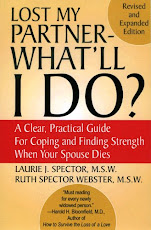
If your late spouse/partner used to handle most of the cleaning chores around the house, you may want to learn how to maintain some basic upkeep, even if you choose to hire a cleaner.
A few years ago, I discovered a series of “how to” books by professional cleaners Jeff Campbell and The Clean Team. The basic book, Speed Cleaning, lays out a very simple system for how to tackle basic cleaning chores.
Although Campbell also promotes his own line of cleaning supplies, it’s not necessary to use them.
I continue to use many of the tips I’ve learned in Campbell’s books.
Let us know if you’ve discovered other helpful resources.
